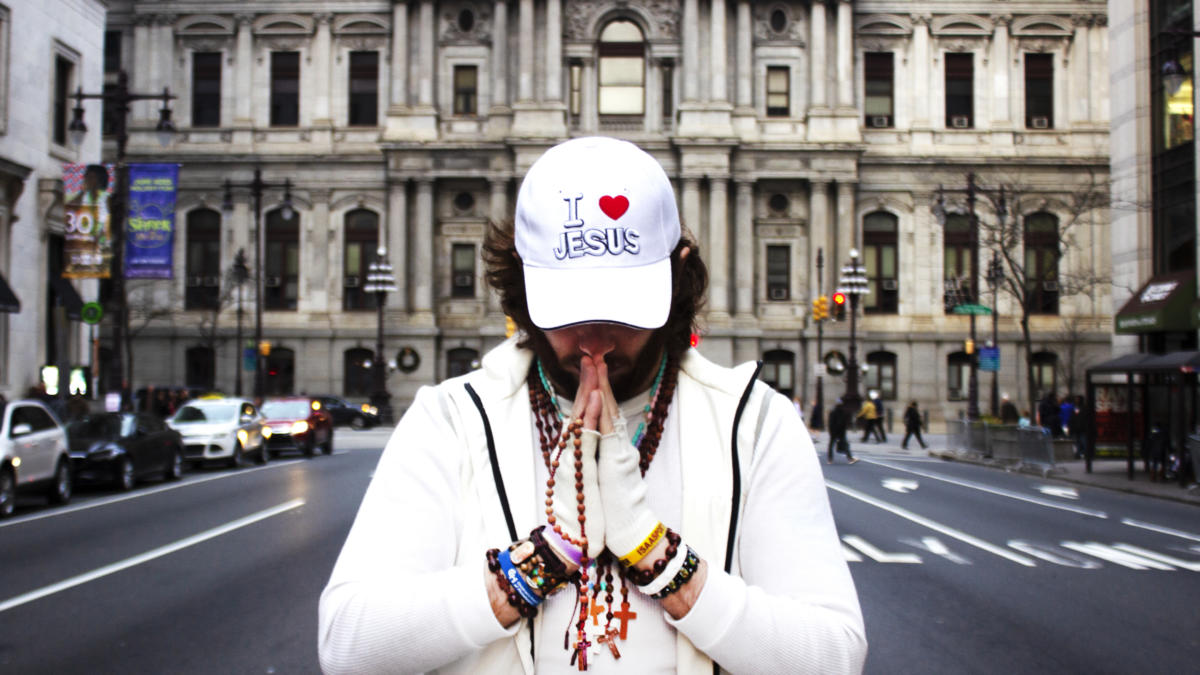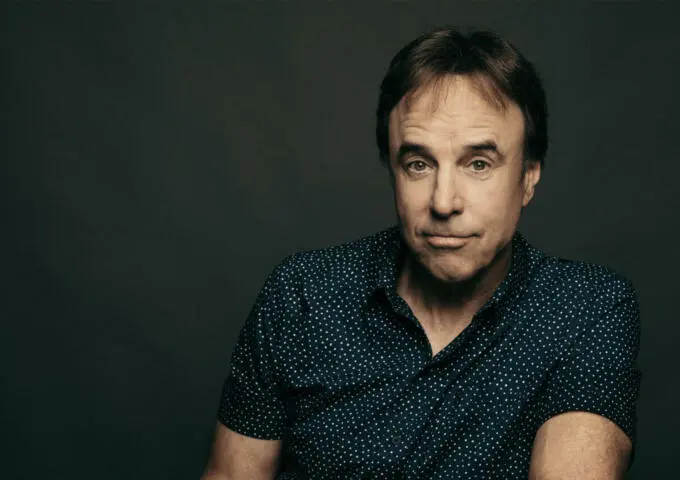“To get high off the stuff you need to take 16 at a time … I doubled the dose because I wasn’t feeling the same effects, and they thought I was trying to kill myself,” Michael Grant explains.
“I overdosed on Coricidin (the over-the-counter cold and flu medicine).”
At 16 years old, the man who would later be known as “Philly Jesus” was in the early throws of drug addiction. Grant went to rehab as a teenager following this Coricidin overdose – it would be neither his first overdose nor his first stint in rehab.
Michael Grant was born in Northeast Philadelphia in 1986, but says he was raised in the Olney section of the city. Early exposure to narcotics and an addictive personality blazed a trail for what would become a decade-long battle with drug abuse.
The story of Philly Jesus is a familiar tale, with an unusual ending. The story of a shy adolescent who turned to drugs to fit in. Those drugs immediately caught up to him, but he seemed to kick the habit by 17.
Then at 19 years old, following a traumatic injury, Grant says he left the hospital with “prescriptions of morphine, Percocet, and opiates.” After initially taking only what was prescribed to him, he began to abuse his pain medicine. Once Grant’s family found out about his drug abuse, they “cut me off to my supply by speaking to my doctor … so I went to the street, I found out about pills on the street and powder form heroin. I began snorting heroin. My tolerance was building up, I was resilient to my normal dosage. Then I was introduced to shooting it up, but I was always afraid of needles so I had someone shoot it up for me…. I’d turn my head and have an old woman shoot me up.”
That is the story of millions of Americans.

The ritual is the same across the country, individuals with a predisposition to drug addiction are triggered by prescription drugs, then, after they’re hooked on prescription drugs, they turn to the street. Addicts introduced to prescription drugs often climb up the “Perc ladder” starting at 5mg of Percocet, then 10mg, 20mg, until they’re popping two 30mg Percocet pills daily. At the top of the Perc ladder, you’re paying for 60mg of Percocet to “achieve” the high you need. This is where most people jump off the ladder, diving into heroin in an attempt to be fiscally responsible.
The prescription drugs that Grant was given set him off on a seven-year opioid bender. “Panhandling, robbing and stealing to feed my addiction,” Grant said, as he speaks with a rare level of honesty when discussing his past behaviors. “From my own biological family members, I would rob and steal. From acquaintances, I would try to befriend people just to like get close to them and steal their wallet. I was a scumbag in my drug addiction, I was horrible.”
Over time, drug addiction beat him into a corner. The days of chasing highs and hunting for heroin on Kensington Beach wore him down.
“Eventually I was writing fake checks and stealing credit cards. Basically, it just all caught up to me. Detectives came to my house,” he said.
Thanks to a dose of white privilege, Michael Grant went to court and was sent to Gaudenzia Rehabilitation Center and not prison.
“From my own biological family members, I would rob and steal. From acquaintances, I would try to befriend people just to like get close to them and steal their wallet. I was a scumbag in my drug addiction, I was horrible.”
Michael Grant, aka “Philly Jesus”
It’s not unusual to find God in rehab. Six steps of “the 12 Step Program” either mention the word “God” directly or allude to a higher power. Although most rehabs claim not to recommend a specific religion, it is suggested that you put your faith in a higher power.
Thinly-veiled Christianity often appears in the language and rituals of rehab centers. For example, the logo for the rehab facility known as Gaudenzia vaguely resembles a Celtic cross. Coincidentally, Gaudenzia is where Michael Grant began on his path to sobriety and re-built his relationship with Jesus.
Grant didn’t enjoy his time in rehab. Socially he struggled, that’s partially why he got caught up with drugs in the first place. Rehab is a fast-paced social setting filled with new faces and confusing backstories, withdrawal and tremendous stress. Grant needed his own space.
“We could either go to an NA (narcotics anonymous) meeting or a Bible fellowship. The majority went to NA, so I went to the Bible fellowship just so I could get away from everyone,” he said.
Grant had a long-established relationship with Christianity, attending Catholic grade school, then Roman Catholic High School. When he first began attending this Bible fellowship, he had standard stoner beliefs: “God’s an alien. The Bible was written by Ancient Astronauts … I used to watch a lot of Ancient Aliens and get high … so that stuck with me.” Before Grant’s departure from rehab and the Bible fellowship, he had done a full 180 and decided it was time to get serious about his faith.
“I’d still be on drugs if I had never accepted Jesus,” he said. After spending ages 19 to 26 addicted to opioids, Grant was finally able to curb his addiction through God.
Religion and faith have a strange way of stepping up when society is failing. Addicts have been let down by drug companies that enabled them, insurance companies that profited off of them, and politicians who allowed it to happen. When society seems to have failed you, God exists as a final refuge. When there is no social safety net, outside forces step in.
Through faith, Grant found sobriety and through sobriety he found even more faith. In the seven years he was addicted to opioids, he ruined relationships with friends, family, and most importantly himself. He spent years plotting his next high, and life passed him by. Grant had been to 20 different rehabs before he got clean, and in that time period he watched addicts like himself drop like flies. It’s no surprise that he views his sobriety as a miracle, because it is. The fact of the matter is, most people who walked in Michael Grant’s shoes are dead or in the process of dying. Surviving seven years of opioid addiction is no small feat.
Through sobriety, Michael Grant transformed into Philly Jesus. Almost every day you can find Grant dressed as Jesus Christ spreading positives throughout Philadelphia. He says he is a performance artist, using his portrayal of Jesus to function as a “billboard for Christ.”
Over the course of the last five years, Philly Jesus has garnered attention and acclaim throughout the city.
It’s a jarring sight to first spot Grant dressed as Jesus Christ among skyscrapers and tourists. People wonder if Grant actually thinks he is God, people wonder if Grant is a right-wing radical, and people wonder where he came from.
Philly Jesus is a product of the opioid epidemic, but he’s also striving to be the modern-day American Dream. He is a man who faced great obstacles, made bad decisions young, and has had to work off those decisions every day since. Like many others struggling with addiction, his struggles don’t stop at sobriety, “getting sober” is just one facet of an addict’s life.
For seven months in 2018, Philly Jesus was isolated to his bed and in and out of psychiatric facilities undergoing treatment for frequent “visions, hallucinations, and mirages.” An allergic reaction to the drug Haldol left him “unable to lift my leg to get in the shower, and I wasn’t able to lift my arm to brush my teeth.” That same year, Grant attempted suicide, his father died, and more recently, his marriage of three years came to an end. Those living with drug addiction, like all people, live full and complex lives.

It’s easy to write off Philly Jesus as a pariah. Grant expressed mild frustration, explaining that it’s not so easy to be Philly Jesus.
“I never called myself Philly Jesus, people gave me that name and I just rolled with it. … I stuck with it for seven years now, nearly every day… but sometimes I’m just too stressed out,” he said.
In 2020, Michael Grant is 33 years old, several years sober and every bit as interesting as he ever was. Grant is currently couch-surfing, without any formal employment or housing. He’s working to fund what he calls “The Philly Jesus Ministry.” As a non-denominational Christian who believes that “true followers of Jesus are part of no denomination,” Grant believes that man-made religion is driven by “the pride and ego of man, thinking that ‘my doctrine is right’ and ‘your doctrine is wrong.’”
Michael Grant’s light and caring disposition is what makes him stand out. His energy is unmatched, and his character is strong. He’s polite and respectful, even when people are not polite and respectful to him.
The story of Philly Jesus is a familiar tale, with an unusual ending. Some 46 percent of Americans say they have a family member or close friend who is (or has been) addicted to drugs. Odds are you have someone like Philly Jesus in your life, a once shy adolescent who turned to drugs and got caught up. Now Philly Jesus bears his cross for all to see, whether we ask him too or not.
“I’m just a late bloomer,” Grant says, “all those drugs held me back … but it is what it is.”




